|
NOTES: Just as you probable are, I'm super pressed for time today. Didn't even know if I'd have time to write this. So I won't waste any more seconds. Back to the story... (CAUTION: The following contains unedited material that may be unsuitable for the grammatically inclined. Keep in mind that I don’t review what I write until after the first draft of the whole novel is done, so please keep your spelling and grammar fixes until the Beta Reader rounds.) Chapter 12 The White House Washington, D.C. 10:49am, December 6th The Christmas decorations adorning every nook in the White House were extravagant as ever. A pile of holly here and twenty handmade wreaths there. Some days the scent of cinnamon or peppermint wafted in from some hidden location. Today it was the smell of fresh pine needles. It reminded President Zimmer of family holidays away in the mountains, something his U.S. Senator father always insisted on, despite whatever crisis gripping Washington. The White House staff continued to set the bar for contemporary yet tasteful decor. To Zimmer it felt like they’d somehow tailored it to the taste’s of their president, even though he hadn’t lifted a finger to help. As he half-listened to a former colleague from the House, he realized that they’d placed little mementos like the painting of snow-covered wood cabin in the hall, the requisite tail of smoke rising from its chimney into the still sky. It looked remarkably like one he’d stay in during his teenage years. They’d done that for him, taken his childhood memories and crafted the holiday in his image. He’d have to remember to thank them personally. It touched him that they would go to such extremes. “Well, Mike, it sounds like you’ve got your hands full. Please let me know how things turn out.” The congressman took the hint and moved on to find another ear for his pet project. The luncheon had been a success. It was small compared to most others they’d hosted since he’d taken the oath of office, but this one was of his own design. He’d wanted to say thanks to those who’d help craft his administration amidst the ever-shifting sands of the world stage. At the top of his list was his chief of staff, Travis Haden. He’d almost had to beg to get the former SEAL to agree to come to Washington, but Cal’s cousin had performed like Zimmer knew he would. Precise. Task driven. Firm but fair. They’d learned a lot from each other and their friendship had grown. Zimmer was happy that he’d been able to thank him in front of the others. There were others, like Rep. Ezra Matisse (D-New Jersey), who’d helped spread the president’s message through the Democratic party in the House. Vice President Milton Southgate, a one-time rival who’d almost derailed Zimmer’s presidency, had probably been the second most helpful, after Travis. It always amazed the president to see what the simple arch of an eyebrow or waggle of a finger from Southgate could do to get the train back on the line. It had surprised none in his party to find out that fully half of the twenty men and women who’d been invited to the thank-you brunch were from the Republican Party and the military. The two highlights from those camps being Congressman Tony McKnight and General McMillan, the Chairman of the Joint Chiefs. Zimmer knew that he might face McKnight in the coming election, but the Florida Republican had been honest and fair. He’d helped Zimmer at a particularly hard time earlier that year when it seemed that the entire world was out to torpedo the White House. The president chuckled when he looked across to room to where Gen. McMillan was telling some story to three Democrats. He could tell they were out of their league, but they listened all the same. Zimmer admired McMillan like one might love a cherished uncle. He was always their with calming, sage advice. No challenge was insurmountable to the Marine general. Zimmer took a sip of his Mimosa and wished that he could’ve invited Cal and the rest of The Jefferson Group. They, above all others, were the reason he was still in the White House, and more importantly, why he was even still alive. But the only people in the room that knew a thing about Cal’s covert charter were Travis Haden and Gen. McMillan. He knew Cal and his team didn’t want or necessarily need the public thanks, but it wouldn’t have been nice anyway. His reverie was interrupted when Rep. McKnight stepped up next to him and offered his own glass in toast. “To a wonderful way to start the holidays, Mr. President.” They clinked glasses and each took a drink. “I meant what I said, Tony. We couldn’t have done what we did this year with your help.” The handsome Floridian smiled. “You may be wanting to take that back come election time.” Zimmer laughed. “How about we just agree that if it ends up being the two of us in the general election, that we’ll try to keep things above the belt?” “I’ll drink to that, Mr. President.” McKnight finished his drink and grabbed another from the table. “I was wondering if you had a second for me to bend your ear.” “Sure. I think I’ve got ten minutes until my entourage drags me out of here kicking and screaming.” McKnight nodded, his face suddenly grim. “Mr. President, I wanted to know how you’re handling the Marine Corps situation.” “And which situation would that be, Tony?” Zimmer already didn’t like where this was going. According to Gen. Winfield, the Marine Corps was doing everything it could to keep a lid on the Assistant Commandant’s death, at least until they could find out more. As for the matter of the bill proposed by that crazy Tom Steiner, Ezra Matisse had informed the president just before the luncheon that he believed the proposal would be laughed out of Congress. There were just too many military veterans serving on both sides of the aisle now. The ongoing wars since 9-11 had seen to that. “I’m not sure if you’ve heard, but I just got word that the Assistant Commandant of the Marine Corps, General Ellwood, committed suicide while on vacation with his family. Zimmer motioned for McKnight to follow him farther back into a corner. “Where did you get your information, Tony?” “I have friends in the Florida law enforcement. They knew I could be trusted with the information.” The president tried to remain calm, but his insides were simmering. “If this gets out before we know for sure —“ Congressman McKnight put up his hand to interrupt the Commander in Chief. “That’s not why I brought it up, Mr. President. I did only so that you would know that I want to help. This won’t stay secret for long, and if someone like Tom Steiner gets his hands on this —“ “So you heard about that too?” Could anything be kept under wraps on The Hill? “I have, and it’s ridiculous. Trust me, I’ll do everything I can to get it thrown out. Steiner will look like an idiot.” Zimmer didn’t know how to respond, and that fact bothered him. He was a career politician, used to wheeling and dealing with every side. Here was another example of a situation that not only slammed into him after a successful pow-wow, but had the potential to make one of the country’s finest assets, the Marine Corps, look bad in the eyes of the country. “Thanks for the heads-up, Tony. I’ll let you know what we find out.” “I would appreciate that, sir. I’d hate to see anything bad happen to the Corps.” Zimmer nodded, suddenly tired. He had to find Travis and tell him the news. His chief of staff might know what to do. They should probably tell Gen. McMillan who could relay it to Gen. Winfield. Zimmer’s mind spun as he started stacking up the to-do list in his head. One thing that crisis after crisis did was condition a brain to compartmentalize and look at things from an objective angle. That’s what they had to do. But there would be much to do, on top of everything they were trying to accomplish with the federal budget. To make matters worse, there was one thing he dreaded doing most, putting in the call to his friend, Cal Stokes. Happy New Year!
19 Comments
NOTES: Thanks for your kind words yesterday. I'm glad you enjoyed a snippet of my grandfather's life. Amazon's Kindle Unlimited (KU): G. Younger asked a question about the NY Times article (read it HERE) that talked about author's current struggles with Amazon, specifically with the new Kindle Unlimited program (this is the $9.99 monthly subscription that allows you to read an unlimited number of books per month within the list of books enrolled in the program). Here's my quick take: I love Amazon. I bought most of my Christmas gifts there and its publishing arm has allowed me to make a full-time living as an author. Up until Kindle Unlimited went live this past summer, I had no complaints. I'm am an entrepreneur. I ran businesses before I started writing novels. I understand what Amazon is doing as a business. They want a huge market share. They're not stupid. Starting this past summer, I went along with the Kindle Unlimited (KU) program and enrolled all my Corps Justice titles. While this cut my per unit profits to roughly half (and now a third), I thought it was giving me more visibility, which would hopefully increase the number of units I could sell, and maybe boost my gross income. After a few months in the program, I'm rethinking my decision. I did not enroll Disavowed in KU, and plan on taking the rest of my books out once my exclusivity time requirement runs out. (the other rub is that I can't sell my books on Apple iBooks, Barnes & Noble, etc... while enrolled with KU. I'm required to be exclusive to Amazon.) So to answer G. Younger's question of "What can you do as readers to support C. G. Cooper?" Hmmm...KU is a good program if you read a ton and you like the books that are included in KU. Not all books sold on Amazon are in KU. I won't tell you to boycott the program or demand that Amazon tear it down. Just know that I am making the informed decision to not include my own titles. This is actually good news for most of you because I'll be allowed to sell my titles on other websites. So if you want to help, keep reading my books and recommending them to friends :) Hope that answers you're question. Now back to the story... (CAUTION: The following contains unedited material that may be unsuitable for the grammatically inclined. Keep in mind that I don’t review what I write until after the first draft of the whole novel is done, so please keep your spelling and grammar fixes until the Beta Reader rounds.) Chapter 11 Disney Yacht Club Resort
9:03am, December 6th Cal was just leaving. He’d spent the last two hours trying to help the Ellwood family in any way he could. It turned out that the best thing he could do was entertain the kids as the adults went about their duties. The little girl, Lily, had taken an instant liking to him, saying, “Up, up, Cow,” every time he put her down. The adults had finished their packing with drawn faces and puffy eyes. More than once Cal felt their eyes on the back of his head. He knew the healing would take time, and judging by the tone of Gen. Ellwood’s son’s voices, they were far from understanding what their father had done. Cal sat down and waited for the bus that would take him to Downtown Disney. From there he would walk to the Hilton where he and Daniel were staying. They were supposed to be calling the Commandant at noon. He hadn’t heard from Daniel since he’d left earlier that morning. The bushes behind the bench rustled. He turned to see what animal was back there, but was surprised to find Daniel’s face instead. Cal noticed faint traces of mud along the sniper’s jawline, like he’d unsuccessfully tried to clean off his face. “What are you doing back there?” “We’ve got a problem,” said Daniel. His calm face was a stark contradiction to the comment. “What happened?” Cal asked, rising to join his friend. He took in the rest of Daniel’s appearance. His jeans were scuffed and wet at the ankles. They moved deeper into the tree line, Daniel not answering the question. They came upon a man sitting on the ground, his head between his legs. He was rocking slowly and looked up when he heard the two Marines approaching. Cal’s eyes went wide. The man looked ten-times worse than Daniel. His preppy clothes were soaked through and there were multiple tears on both his paisley shirt and his tailored pants. It took a moment for Cal to recognize the guy. It was that NCIS agent. Cal frowned. “What the hell is he doing here?” Cal asked. “They tried to kill us,” blurted Special Agent Barrett, wiping a droplet of blood from the gash on his forehead. Cal looked at Daniel. “What’s he talking about?” “My hunch was right." “What hunch?” Daniel shrugged. “I told you I was going back to take a look at the crime scene.” “And?” “I found a sniper’s nest.” “What? You never said anything to me.” “I didn’t want to get your hopes up.” Cal shook his head, trying to understand what his friend was saying. “Are you telling me that General Ellwood was shot by a sniper?” “No way,” interrupted Barrett. “The ballistics all came back positive for a self-inflicted wound.” Daniel nodded in agreement. “I’m not saying that anyone else took the shot.” Cal exhale almost came out in a huff. “So what are you saying? How do you even know it was a sniper’s nest?” He knew it was a stupid question as soon as it left his mouth. Daniel wasn’t just any Marine sniper. He was the Marine sniper. Cal had never seen or heard of anyone better. “First, from the faint markings and general settling in the area, I’m eighty percent sure whoever was in that nest was there when General Ellwood pulled the trigger. Second, whoever it was, and it was one man without a spotter, they knew what they were doing.” “You didn’t say anything to me about that!” said Barrett. “Are you telling me that there’s a sniper running around?” Daniel cocked his head, regarding the disheveled NCIS investigator. “Who else did you think was shooting at us?” Barrett’s mouth dropped open. “Hold on. You’re telling me that a sniper took the time to infiltrate the area, setup a perch, watch the general shoot himself, and now he’s dumb enough to come back and shoot at you guys?” Cal shook his head. “It doesn’t fit, Daniel. Why would he do that?” “I’m not sure. Maybe he left something. Maybe he was checking in on the investigation. Who knows.” Cal tried to imagine what might possess a professional to risk detection by revisiting the location he’d successfully exfiltrated. It didn’t make any sense. “Okay. Let’s assume it was the same guy. Let’s assume that he’s just dumb enough to snoop around again. Why was he there in the first place? Why didn’t he kill Ellwood himself?” Daniel crossed his arms over his chest and said, “Because he was only there to make sure General Ellwood took his own life.” +++ The sniper cursed as he watched the smoke from the small fire he’d lit at his former hide. He’d misjudged the Commandant’s emissaries. If it hadn’t been for that Boy Scout troop who’d literally almost tripped over him the morning of Ellwood’s suicide, he wouldn’t have even considered coming back. He heard them before Ellwood took a shot, and assumed incorrectly that they’d take a more circuitous route, or even run away from the gunfire. Instead they’d found the highest point they could. That spot happened to be right where he was gathering his gear and preparing to leave. The six Boy Scouts and the parents hadn’t seen him. He was too good for that. But in his rush he hadn’t had time to fully cover his tracks. That had necessitated the return trip. If he hadn’t it would have nagged at his fastidious brain for months. What he hadn’t counted on was Daniel Briggs make his own visit. The sniper had hoped that Briggs had already had his fill of the scene. Briggs and Stokes were reportedly booked on a three o’clock flight back to Virginia. But once again all his planning was for naught. Luckily his rifle was in the trunk of his car, just in case. He’d stalked his prey and whomever the companion was. His shot was ready, crosshairs leveled. But at the last moment he’d recognized the other man. It made the sniper hesitate. Killing Briggs and stashing the body was one thing, but getting the NCIS even more involved could mean real trouble, trouble he and his employer didn’t need. His hesitation not only cost him the killing blow, it also complicated the situation. They’d gotten away, somehow disappeared. He didn’t dare chase them down. Not now. It would have been too risky. But his employer would understand. He knew the uncertainties of the battlefield and the fog of war whose untimely presence rarely failed to make itself known. He smiled as he put his car in drive and pulled out onto the dirt access road. If he and his employer could make a Marine three-star general take his own life, it would be easy to take care of Daniel Briggs and Special Agent Barrett. NOTES: Okay. Heart on the sleeve time. Today's installment is the most personal I've written to date. One of the characters/influences I'm about to introduce to you was, in fact, a very close family member, my hero, my grandfather, LtGen C. G. Cooper, USMC. The story I tell in this chapter about the Band of Brothers concept is paraphrased but true. I decided to let you into my world for a moment because the day I published Disavowed, December 19th, 2014, we lost my grandmother, Carol Cooper. I know she's with Gpa now, so everything's okay on that end, but part of why I started write in the first place, was to ensure that his legacy lives on. So as I struggled to come up with an answer for our fictional Commandant, the beginning of the solution came. This will give you some good insight into why I write the way I do, and why I believe good always triumphs over evil, especially when Marines are in the mix :) I won't try to tell you his story (you can actually see his memoir HERE), but I did want you to know that the eleven conceptual points in this chapter are what I grew up on and what I tried to live by as a Marine. I wasn't always perfect, but at least I had an example to look up to. He was a Marine's Marine, a true leader, a trusted friend. Not only that, he was a loving grandfather who could tell a story better than anyone I've ever known. His laugh was infectious and his hugs were bear-like. I imagine my grandparents as they walk hand-in-hand through the Pearly Gates, nodding to the Marines standing their eternal post. Grandpa's probably telling another tall tale and Grandma is chuckling dutifully like a proper Southern lady, finishing with, "Oh, Charlie". I'm thankful for everything they taught me, and promise to never forget the lessons that I learned. Here are a couple pictures. You should be able to click on them to zoom in. The first two are the actual laminated card that he gave me in 2000. It's posted in my office where I see it every day. And the bottom picture is a hand-drawn sketch done for him before his retirement. Now back to the story... (CAUTION: The following contains unedited material that may be unsuitable for the grammatically inclined. Keep in mind that I don’t review what I write until after the first draft of the whole novel is done, so please keep your spelling and grammar fixes until the Beta Reader rounds.) Chapter 10 Camp Lejeune, North Carolina
7:47am, December 6th The Commandant of the Marine Corps waved goodbye to the formation of outside of 3rd Battalion 2nd Marines. They’d invited him for morning PT, and although he was three times the age of some of them, he could still more than hold his own. There was something about being with a Marine infantry battalion that got his blood flowing, reminded him of what it was all about. He needed that on this day more than ever. The infantry Marine, grunt, knuckle-dragger, ground-pounder, was the core. Every other specialty, from supply to intelligence, supported the infantry. Even Recon Marines and their elite brothers in Force Recon were technically tasked with supporting the lowly grunt. It was the way it had always been. As an infantry officers in his earlier twenties, Winfield had the privilege of leading Marines from every walk of life. They came in all shapes and sizes. Sometimes they were such a challenge that you wanted to wring their necks, but in the end they were family. You took care of family. As they pulled away from 3/8’s headquarters, Gen. Winfield reflected on his new mission. He was somehow supposed to save the Marine Corps from the worst fate imaginable: extinction. And with what? A handful of trusted advisors and a former staff sergeant. While he didn’t doubt Stokes’s abilities (he had come recommended from none other than President Zimmer himself), he was beginning to seen the tidal wave forming on the horizon. First came the tremors, the warning from Gen. Ellwood. Then came the rumble, Gen. Ellwood’s death. And just this morning he’d found out about the FBI raid on the Marine offices in Dulles. The head of the liaison section, Col. Pearce was now under questioning. He’d fielded thirteen phone calls from politicians on both sides of the aisle, some wanting answers and some looking for blood. It felt like the enemy was coming from all sides, attacking in the dead of night, then slinking back in the mist. What he needed more than ever was a shred of hope, a clue as to where the next attack would come. It wasn’t like he could close ranks and tell his Marines to seek cover and be at the ready. No, this was a nefarious foe who’d already shown a penchant for surprise. His mind wandered as he gazed out the window, Marines going about their morning routines as they had for hundreds of years. What would they think if they knew what they were up against? They passed by a set of pull-ups bars. The sight of a Marine attempting to do a one-armed pull-up reminded him of an old friend, one of his mentors who’d taught a young bitter Marine captain what the Marine Corps should be. He pulled out his military ID card from his wind-breaker pocket. It was wrapped in a rubber band. Winfield flipped it over and pulled a frayed laminated yellow card out from behind his ID. The card had a faded note on the front next to the FMF-PAC (Fleet Marine Forces Pacific) Command logo. It said, “Keep that candle high and you’ll always have your troops with you.” Below the logo was a simple title: Band of Brothers. The card’s content had been written long before the popularity of the Band of Brothers book or movie. It was penned from a military hospital in 1951 by a wounded Marine second lieutenant who’d just been told his wife had given birth to a healthy baby boy. It had started out as a letter to his newborn son, sort of a “this is how to live you life” thing that a father should pass on to his children. But the birth wasn’t the only reason the lieutenant wrote it. He’d also been told that he would be forever paralyzed from the waist down, never to walk again. His Marine Corps career was over. And so he’d written the letter to his son, trying to imagine what life would be like without his beloved Corps, without the ability to walk like a man, like a warrior. Something about the simple act of writing emboldened him, it made him realize that the fight was not yet lost. The thought of seeing his son only heightened his resolve. He wrote his rules to live by and secretly enlisted the aid of his hospital ward compatriots. The mission was simple: he would walk again. And walk he did. Despite the intelligence and prognoses of a dozen doctors, that Marine lieutenant shuffled to the hospital door with a box of cigars in hand, shouted the announcement about the birth of his son down the hallway as he tossed the cigars in the air, and then passed out cold. When he came to, the lieutenant was surrounded my medical staff demanding to know how he’d done it, how he’d walked despite his wounds. He would go on to win the Silver Star for his exploits in Korea, and he would go on to serve thirty five years in his beloved Corps. Captain Winfield had met LtGen. Charles G. Cooper when he was at a crossroads in his own career. He was bitter about where his tour was headed, and the caliber of Marine officers in general. Gen. Cooper had seen the pain on his disgruntled face. He’d requested to see Winfield and they’d taken a short walk along the coast in Kaneohe Bay. The general didn’t say much, he mostly listened. He trudged along asking questions, and for some reason, Winfield poured his guts out. When they finally reached a point overlooking a beautiful slice of the shining Pacific, Gen. Cooper reached into his pocket and pulled out a yellow card. He told Winfield the story about how it came to be, and the solemn promise he’d made to God should he be allowed to walk again. “I told God that I would spend the rest of my life giving our young Marines the kind of leadership they needed and deserved.” Gen. Winfield, now the Commandant of the Marine Corps, wondered what his now-deceased former commander would say if he what Winfield was facing. He knew what the Mississippi general would say. He’d tell him to keep his candle lit and live by the words on that tattered card. Winfield smile and read it: BAND OF BROTHERS 1. All Marines are entitled to dignity and respect as individuals, but must abide by common standards established by proper authority. 2. A Marine should never lie, cheat, or steal from a fellow Marine or fail to come to his aid in a time of need. 3. All Marines should contribute 100% of their abilities to the unit’s mission. Any less effort by an individual passes the buck to someone else. 4. A unit, regardless of size, is a disciplined family structure, with similar relationships based on mutual respect among members. 5. It is essential that issues and problems which tend to lessen a unit’s effectiveness be addressed and resolved. 6. A blending of separate cultures, varying educational levels, and different social backgrounds is possible in an unselfish atmosphere of common goals, aspirations, and mutual understanding. 7. Being the best requires common effort, hard work, and teamwork. Nothing worthwhile comes easy. 8. Every Marine deserves job satisfaction, equal consideration and recognition of his accomplishments. 9. Knowing your fellow Marine well enables you to learn to look at things “through his eyes”, as well as your own. 10. Issues detracting from the efficiency and sense of well-being of an individual should be surfaced and weighed against the impact on the unit as a hole. 11. It must be recognized that a brotherhood concept depends on all members “belonging” - - being fully accepted by others within. The Commandant closed his eyes and said a silent prayer of thanks. He knew the coming battle wouldn’t be easy, but he had the answer once more. |
NOVELS LIVE
Join me as I write a new novel LIVE with your input. Tell me what you like, what you don't like. This is a joint mission to write a kickass novel. Categories
All
Archives
February 2017
|
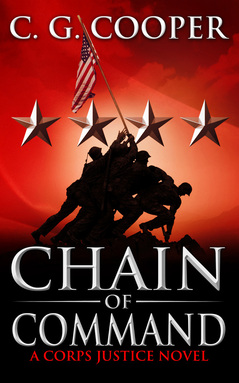
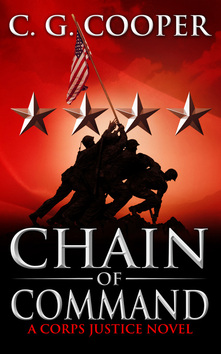
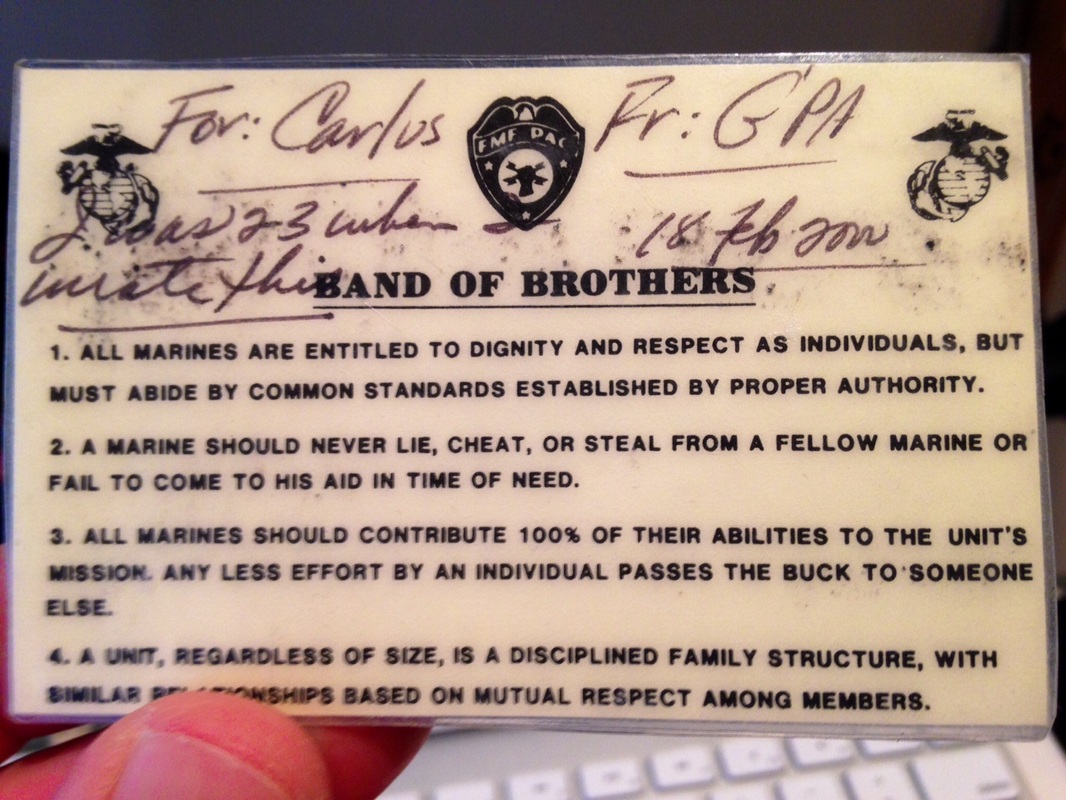
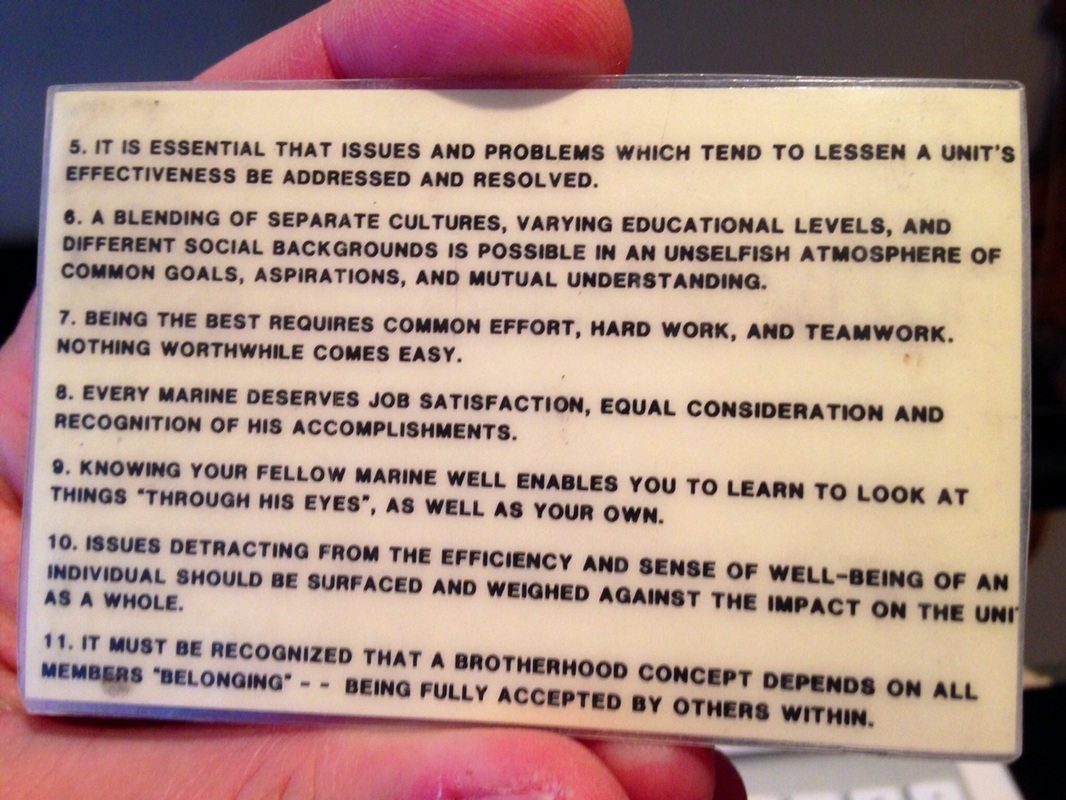
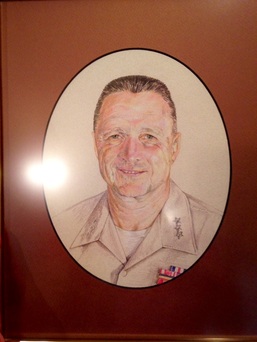
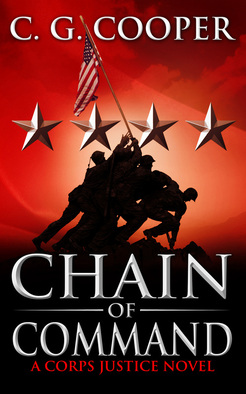
 RSS Feed
RSS Feed